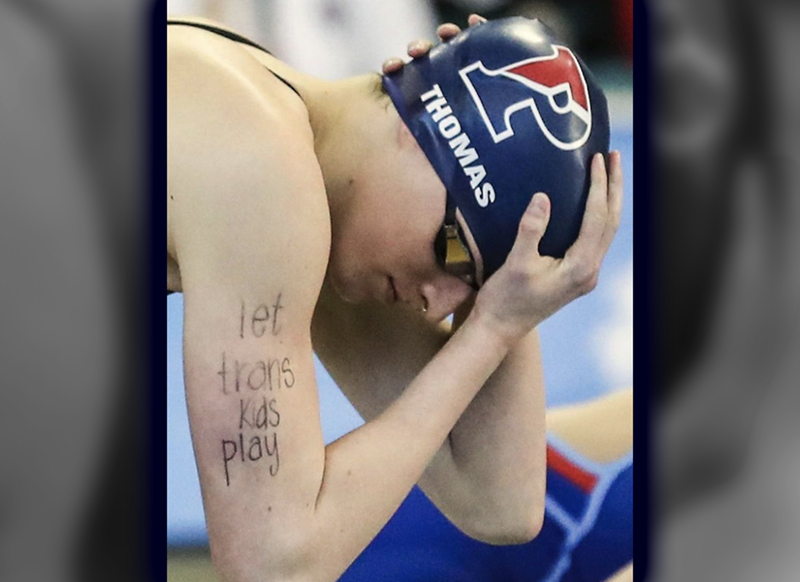Lia Thomas Sues to Overturn World Aquatics’ Transgender Ban
Former collegiate swimmer Lia Thomas has petitioned the Court of Arbitration for Sport to overturn World Aquatics' ban on trans athletes.

Lia Thomas is suing to challenge a prohibition on transgender athletes imposed by the governing body for water athletics.
According to The Telegraph, Thomas — the former University of Pennsylvania swimmer who won the 500-yard freestyle race in the 2022 NCAA Division I Swimming and Diving Championships — has petitioned the Court of Arbitration for Sport (CAS) in Switzerland to overturn rules prohibiting transgender athletes from competing in world championship events, and at the Olympics, based on their gender identity.
Thomas’s victory in the 500-yard freestyle sparked a backlash against transgender athletes in the United States, prompting FINA, the predecessor to World Aquatics, to adopt rules prohibiting transgender females from competing in women’s events if they have undergone “male puberty.”
Only those athletes who have never developed secondary sex characteristics, or those who started puberty blockers prior to age 12, are exempt from the ban.
World Aquatics has justified the restrictions on transgender participation, saying it based its recommendations on a scientific policy document that concluded that transgender women swimmers retain significant physical advantages over cisgender women, including increased muscle mass and lung size, even when they suppress their testosterone levels.
Along with its adoption of the transgender athlete ban, World Aquatics sought to create an “open” category that would be open to individuals, regardless of gender, in which transgender athletes could compete.
The category’s first races were scheduled to be held at the World Cup in Berlin last October. But when the World Cup came around, the events had to be canceled due to lack of interest.
Nonetheless, World Aquatics said that its working group on transgender athletes would continue to stand by the ban and look for other ways to allow transgender swimmers to participate.
“Even if there is no current demand at the elite level, the working group is planning to look at the possibility of including open category races at masters events in the future,” it said in a statement following the cancellations.
Critics of the policy say that the number of transgender athletes competing at the elite level is so small that it would be unrealistic to maintain an “open” category at major meets.
Additionally, “open” category races — even if held at world championships — do not allow a swimmer to qualify for the Olympics, which only has two categories based on biological sex.
The International Olympic Committee has a general framework surrounding transgender participation but has left it up to individual sporting bodies to determine whether an athlete is eligible for men’s or women’s events.
Even if Thomas were to compete in, and do well in, “open” category races, she would not qualify for the Olympics — which she told Good Morning America in 2022 has been her longtime goal.
Thomas, who began transitioning fewer than three years prior to her win, said she transitioned to affirm her gender identity, not to gain a competitive advantage.
Although Thomas hasn’t competed since 2022, she first appealed to the CAS in September. World Aquatics objected, asking the court to throw out her case because she’s not a member of USA Swimming, the U.S. athlete association that falls under World Aquatics’ purview.
Thomas’s lawyer, Carlos Sayao, has slammed the ban as “discriminatory” and alleged it causes “profound harm to trans women.”
“Lia has now had the door closed to her in terms of her future ability to practice her sport and compete at the highest level,” Sayao said. “She’s bringing the case for herself and other trans women to ensure that any rules for trans women’s participation in sport are fair, proportionate, and grounded in human rights and in science.”
World Aquatics declined to comment on the policy, although its executive director, Brent Nowicki, released his own statement to The Telegraph.
“The World Aquatics policy on gender inclusion, adopted by World Aquatics in June of 2022, was rigorously developed on the basis of advice from leading medical and legal experts, and in careful consultation with athletes,” Nowicki said. “World Aquatics remains confident that its gender inclusion policy represents a fair approach and remains absolutely determined to protect women’s sport.”
Support Metro Weekly’s Journalism
These are challenging times for news organizations. And yet it’s crucial we stay active and provide vital resources and information to both our local readers and the world. So won’t you please take a moment and consider supporting Metro Weekly with a membership? For as little as $5 a month, you can help ensure Metro Weekly magazine and MetroWeekly.com remain free, viable resources as we provide the best, most diverse, culturally-resonant LGBTQ coverage in both the D.C. region and around the world. Memberships come with exclusive perks and discounts, your own personal digital delivery of each week’s magazine (and an archive), access to our Member's Lounge when it launches this fall, and exclusive members-only items like Metro Weekly Membership Mugs and Tote Bags! Check out all our membership levels here and please join us today!




























You must be logged in to post a comment.